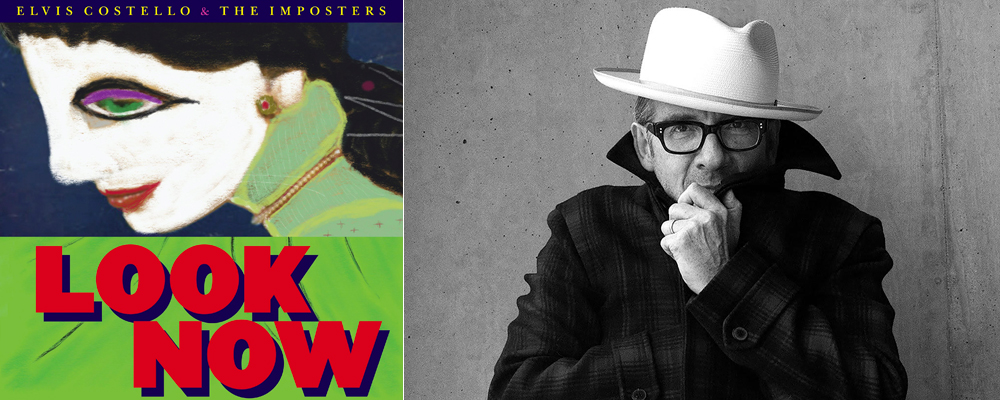Elvis Costello Returns to the ‘Imperial Bedroom’ Era on ‘Look Now’
Adi Mehta
Elvis Costello emerged in the new wave scene, with a sound that was somehow punk rock without actually being punk rock at all. There were little sonic signifiers peppered throughout, and an overall attitude that made its way into his music. From the beginning, in 1977’s “My Aim Is True,” his songwriting stood out, revealing a true master at his craft, stringing together infectious tunes with insightful, often rather opaque lyrics. He has always been a bit of an enigma, shifting shapes over the decades, whimsically delving into random genres, as in the country-heavy “King of America.” His “Imperial Bedroom” album has been applauded by critics as a mark of transition, placing him in the ranks of Gershwin, etc. It all gets a bit pedantic at some point, and you just have to take the music for what it is. That said, Costello’s latest offering, “Look Now,” finds the artist in his most subdued, reflective form. It is understated, yet lyrically incredible, and full of Costello’s signature touches.
From opener “Under Lime,” this is a revisiting of the “Imperial Bedroom” era. These are restrained, thoughtful songs, carefully crafted, but not particularly punchy. If Costello’s early output seemed punk without being punk, this seems lounge, without being lounge. There’s a prevailing mood of dim-lit ‘70s nightclubs, even though the music seems somewhat timeless. Midway, a horn section bit gives the song a Sergeant Peppers vibe, making it all delightfully camp. The key feature of this track is the lyrics, with Costello presenting a narrative, and describing the characters with poetic detail, leaving everything open ended, leaving you stirred and musing on tangential thoughts. “Don’t Look Now” sounds like Elvis Costello putting on no fronts whatsoever. In his early work, he would slightly alter his voice to sound fashionable, but he’s now just showing up and singing, with a “take me as I am” attitude. There are little trademark quirks of his, like his pronounced vibrato at the end of lines, that give the song — and the whole album, in fact — some identity. Lyrically, it’s an incisive song. Do you know when you’re walking on the street, and you can feel someone looking at you, even though you haven’t seen them, and when you turn your head, sure enough, you’re eye to eye? This song taps into that feeling, and really goes to town.
“Burnt Sugar is So Bitter” captures the experience of life after a failed relationship. It’s a widely relatable topic tackled with an articulation that resonates profoundly. Backup R&B female vocalists, and more horn sections give it something of a retro bent. Costello sings, “She picks up the bills, pays off the babysitter / Because everybody knows burnt sugar is so bitter.” It launches you headlong into a stark domestic life and broken dreams. The horns somehow romanticize the whole affair, and end up conveying the idea of finding harmony in distress. “Stripping Paper” again finds Costello weaving a tale in vivid detail, but at this point, things are arguably getting a bit too sleepy — reflective piano man on afterhours tenure. Luckily, “Unwanted Number” brings a little spark. It sounds like it could have been a cut from 1986’s “Blood & Chocolate.” It seems to examine the curious alacrity with which people treat other people like disposable objects, and move on as if it’s no thing. Costello sings, “I will give my love to another unwanted number.”
“I Let the Sun Go Down” has production that recalls George Martin’s envisioning of Beatles songs. Lush strings also give a vaguely “Pet Sounds” vibe. “Mr. and Mrs. Hush” picks up the pace, sounding almost like the Attraction days, but without the glaring eighties bookmarks. The title itself has enough allure to make for an intersting track. “Photographs Can Lie” starts off in the vein of “Almost Blue,” which became a jazz standard, and regularly leaves people dumbfounded upon hearing that it was written by Elvis Costello. The song explores the hidden distress behind a seemingly model couple, with lyrics like, “In a frame under glass / They’ll always be together and so in love / But photographs can lie.”
“Dishonor the Stars” achieves a balance between the contemplative piano drivelry that characterizes most of the album, and the beat-driven fare that makes for much of Costello’s classic sound. This song is totally “Imperial Ballroom”-era Costello, and will be a real treat to long-term fans. “Suspect My Tears” sounds like it’s from 1985, with gospel-esque diva backing vocals, and it doesn’t seem designed as retro fare. This could be seen as dated, but on the other hand, why not? The line “I’ll cry until you suspect my tears” is a such a loaded snippet as to qualify the song on its own. “Why Won’t Heaven Help Me,” with the combination of its archaic musical style and desperate sentiment is a bit unseamly. “He’s Given Me Things” recovers things, showcasing Costello in an intimate and poignant performance, again with his narrative lyrics, in the tradition of classics like “Alison.” The music has a bittersweet tone that ends the album in limbo.
“Look Now” is a look back at a specific era in the career of a wildly versatile, prolific artist. It’s a flashback to the “Imperial Bedroom” era, when Costello took a step back, and fleshed out reflective tracks that demonstrated a songwriting prowess that elevated him, in popular opinion, above his peers in popular music. And although the album is a decidedly subdued affair from beginning to end, this is presumably the intended spirit of the music. This is an album for dwelling over thoughts late at night, with a smirk, and a twinkle in your eye.
“Look Now” is available Oct. 12 on Apple Music.

